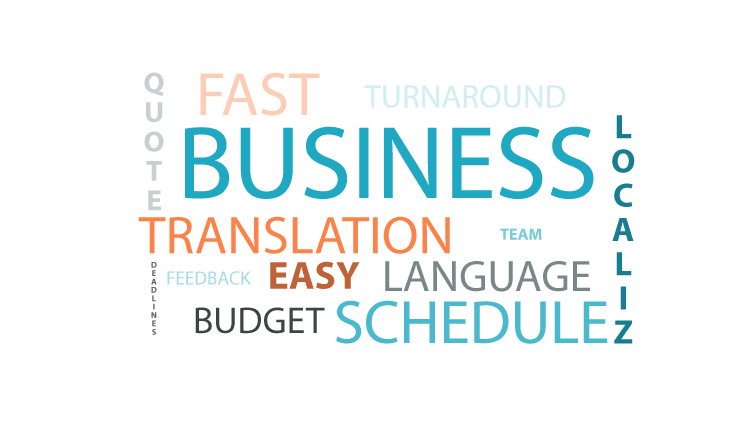A Few Considerations Regarding Translation for Business

Despite public belief that translation for business can be done by anyone knowing two languages, there is a lot more to it. Some business documents can be translated by general translators while other documents have to be translated by linguists specialized in a certain field.
Translation for Business needs special considerations
There are quite a few different types of documents a business might need translation for. Some, like business correspondence, marketing materials and ad campaigns are easier to translate and localize to a specific area, there are other documents which have special requirements, like legal contracts, accounting documents (income sheets, balances, annual report, etc), and technical documents. Such documents simply cannot be translated by just about any translator.

Specialized Translators
When it comes to translation for business, it is best to have a translation agency handle the work. Freelance translators may be good, but in this case, specialization plays an important role so a specialized translator is needed. While you could get a freelancer specialized in legal documents, you will have to find another one for business operations and another one for technical translations. This means you have to waste your time searching for freelancers and testing them before having the actual work done. Since time is money, this might not worth it.
The need for a specialized translation agency
A translation company has translators specialized in just about any field and is able to provide quality translation for business. They are able to quickly assign specialized translators to do your job. They are also able to find other specialized linguists to proofread the translations. A translation company will have the documents pass through a rigorous quality assurance process before actually delivering the final product to you.
Frequently Asked Questions
What is translation in business?
In the business world, translation is what makes deals with foreign nationals possible. No agreement or contract with foreign investors can be signed without getting all the important papers translated. It is the linguistic experts that make it possible for businesses to survive in foreign countries and connect with their audiences.
How do I start a translation business?
If you want to start a translation business then you should get a degree in the field first. You should also work in the industry as a translator so you can get an idea about the field. You should also do market research to figure out what rates you should charge clients. Once you are ready, you can open your company and start hiring linguistic experts.
How much does it cost to translate 1000 words?
The cost of a translation varies from one translation agency to the next. If you need standard translation of 1000 words and hire a good agency, you will only have to pay $0.10 per word. If you need certified translation, you will have to pay $0.12 per word. If you receive the completed project within 24 hours then this is a pretty good deal.
Does translation have a future?
A lot of professions are being taken over by technology, but there are a few things that machines can do. Translation is one such thing that only humans can handle properly. This means that translation does have a future because it will continue to be important in this linguistically diverse world. People will have to turn to human experts to get the help they require.
Shorter deadlines and lower costs
Another advantage of working with a translations company is that you get your translations faster and possibly at a lower price. Some costs are cut out due to the fact that you only pay once instead of doing multiple payments.
But the most important advantage of outsourcing translation for business to a company is the fact that you can relax and wait for the translation to come. You are able to communicate with the project manager in charge of your project and any time, you are always being informed about the status of your project and you can sleep better knowing that you will get your translations in time.

Issues can occur due to mis-translations
With more and more businesses developing their services globally, ensuring that businesses are interacting productively with their foreign clients is of the utmost concern. Not being able to understand what a deal says or accidentally insulting others because of a marketing translation mistake are among the various issues that can occur when both companies do not understand the same language.
To help overcome the language barrier, several business owners are employing the use of business translation services, which are intended to make sure every business document, website, products, and marketing material whether it be a site or advertisement is translated correctly.
Rather than using computer translation programs for business to translate, business translation services use accredited human translators to work on every business project. This gives them an advantage in that they can understand the particular cultural nuances of local languages that can quickly change the meaning of a translation.
Whether you are on your way to Italy to give a presentation, or you want to compare a show to its original Italian, English to Italian translation service is required in a wide array of activities. Whether your business is art, performance, and music, or clothing and style, the Italian market is exceptionally vital to these specific industries.
The best piece of advice is: Don’t settle for anything else but the best when it comes to translation for business. It really does not worth the time, the stress and the risk to entrust such an important part of your business operations to the first guy you find on the internet.
Translating for Global Markets
Professional translators and translation agencies play a pivotal role in bridging language barriers, ensuring that messages are conveyed accurately and effectively to the target audience. By employing a wide range of experts fluent in the target language and well-versed in the cultural nuances of the native language of the content, these agencies are able to provide high-quality translations that resonate with the intended audience.
The key to their success lies in the meticulous selection of translators who not only have a profound understanding of the language pair but are also sensitive to the specific needs and preferences of the target audience. This dedication to accuracy and quality ensures that every translation, regardless of its complexity or domain, meets the highest standards, facilitating clear and effective cross-cultural communication.
In the translation industry, the transition of content from the source language, often English, to various languages for a foreign market necessitates a high degree of precision and cultural sensitivity to effectively reach an international audience. Reliable translations are the cornerstone of global communication, enabling businesses to convey their messages accurately across cultural boundaries. Translation service providers employ a skilled translation team, proficient in both the source and target languages, to ensure that each translation meets the rigorous standards demanded by diverse markets.
This commitment to quality and understanding in the translation process is what allows companies to successfully connect with customers and stakeholders worldwide, fostering trust and engagement in an increasingly interconnected global economy. In the field of translation, managing complex translation projects requires a deep understanding of both the source and target languages, as well as expertise in the specific subject matter.
Global Market Translations
Accurate translations are vital when dealing with financial statements and legal documents, as these materials often contain specialized terminology that must be precisely rendered to avoid misinterpretation. The use of translation memory systems by qualified translators enhances the consistency and efficiency of translating these complex documents, ensuring that specific phrases and terms are uniformly translated across all materials.
This level of accuracy is paramount for businesses and individuals looking to operate in international markets, where the clarity of financial statements and legal translations can significantly impact decision-making and compliance with local regulations. By relying on professional translation services that specialize in these areas, stakeholders can navigate the intricacies of global commerce with confidence, knowing their documents reflect the intended meaning and adhere to the highest standards of accuracy.
NMT vs. Human Translation
Neural Machine Translation (NMT) has revolutionized the field of translation by providing faster, more accurate real-time translation services for a wide range of languages, including the English language. This advanced technology, powered by artificial intelligence, can process and understand the nuances of language at a level approaching that of human translation.
However, for nuanced or complex projects, the expertise of human translators remains irreplaceable, especially when cultural subtleties and technical accuracy are paramount. The integration of NMT with Translation Management Systems (TMS) has further streamlined the translation process, offering a seamless blend of human expertise and machine efficiency. This combination ensures a comprehensive range of translation services that can meet the diverse needs of global communication in the digital age.




